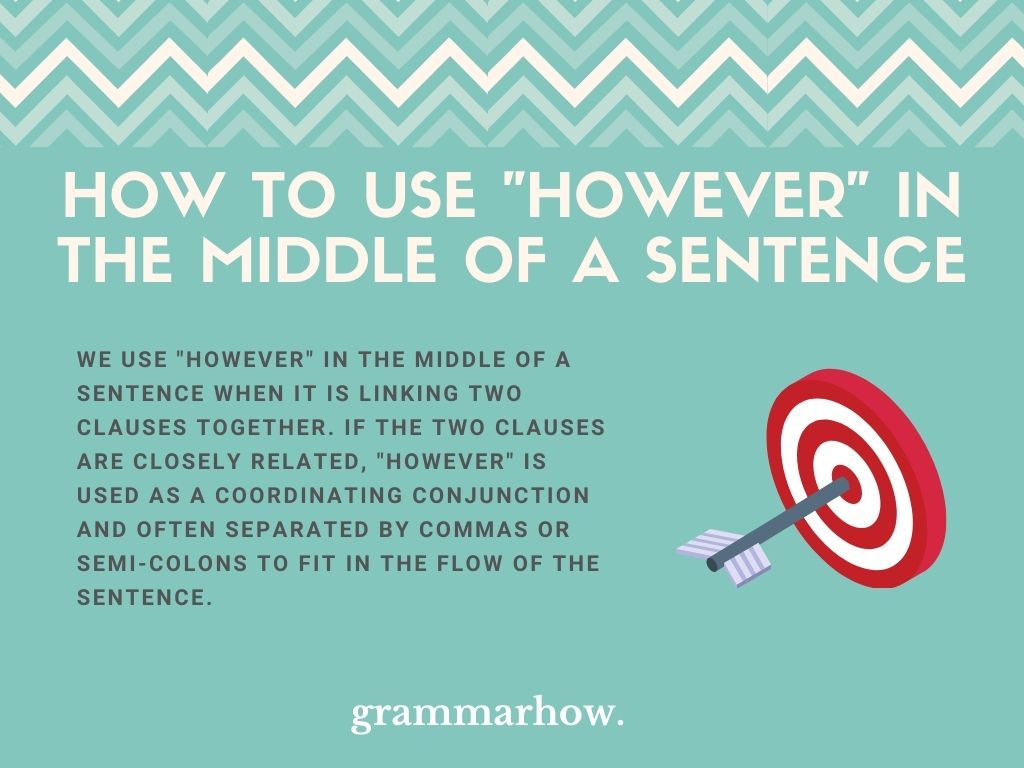I wrote in my Writing Well post, “Two Tricks to Help You Remember When to Insert a Comma Before ‘So,'” I emphasize the need to be aware of the way “so” is being used in the middle of a sentence before deciding whether or not a comma is appropriate to be placed before it. The same is true for the two terms commonly substituted within the middle sentences, “but” and “however.”
Although “but” (like “so”) is frequently employed as a conjunction, it is also employed as a different part of speech, for example, as an adjective. However, “however” can be used as a conjunction or adverb. Consider the following: “He likes to eat salad, but he loves sushi.” Because in this example, “but” is being used as an adjectival (in this case, meaning “on the other hand”) connecting two distinct clauses, a period precedes it. (For more details on conjunctions, what clauses they connect, and punctuation tips for them, look up the Writing Well post “How to Correctly Create Connections with Conjunctions.”)
How To Use However In The Middle Of A Sentence

We employ “however” in the middle of a sentence when it connects two sentences. If two phrases are linked, “however” is used as a coordinating word and is usually separated by commas and semicolons to accommodate the flow of the sentences.
Do You Need a Comma When Using However as a Conjunctive Adverb?
A conjunctive adverb connects two separate clauses into the compound sentence. An independent clause can stand on its own as an entire sentence. “However “however” introduces a contrast or opposition between two distinct clauses.
Consider it as a contrast to however or. If you choose to use it in this manner, an alternative is to add an apostrophe before the semicolon and after the but:
The car was stunning, but it was highly inefficient on fuel.
The salad was loaded with delicious vegetables. However, it was not appropriately dressed.
If you’re not a fan of semicolons, an alternative is to place a period at the beginning of the first phrase. You can capitalize it, but make sure to keep the comma following it:
The car was gorgeous. But, it was incredibly fuel-inefficient.
The salad was bursting with delicious vegetables. However, it was dressed poorly.
However,’ Without a Comma: Modifier
The comma is significant as it is a conjunctive adjective that can be utilized in two ways: it joins main clauses and alters an entire clause.
If you put but at the start of the sentence and do not include a comma, however, it means “in whatever manner,” “to whatever extent,” or “no matter how.”
For example, Winston Churchill said, “However beautiful the strategy, you should occasionally look at the results.” For those who prefer more contemporary instances, in the tv show House, Dr Foreman said, “However bad you think you’re going to be in that room, not being there is worse.”
In both cases, it’s not playing the role of a conjoining. It’s not connecting anything to or relating to anything else. It’s the equivalent of “no matter how.” “However bad you think you’re going to be” and “No matter how bad you think you’re going to be” both mean the same thing. I don’t know anyone who has ever been able to argue the beginning of sentences with “however,” but it’s done that in that way.
Examples Of Using However In The Middle Of A Sentence
We’ve already shown you one illustration (as some punctuation mistakes). It’s now time to show you several others. We’ll try to include as many examples as possible, which gives you a variety of situations where the word is best when it is in the middle of the sentence.
It isn’t easy to locate the correct answer, yet you’ve studied for months.
Some people disagree with me, but I’m sure I’m right.
It’s not a suitable building. However, I believe the next one is.
There are not any items there, but you may try again when it helps the difference in your mood.
There aren’t a lot of good people around the globe. However, I did meet a fantastic man on the bus this morning.
“However” at the Start of a Sentence
It’s a choice for style and not much else since we have plenty of evidence that writers have used but to start sentences, often using the word “nevertheless.”
“However, I am sure James does not drink so much.”
–Jane Austen, Northanger Abbey, 1818
He remained in taking concern for him and offered him the use of his Horse to transport his body to the following town to have the facilities for drying his Clothes and also getting some Refreshments.
–Mary Davys, The Cousins, 1725
There is no explanation for the insanity of women. In my case, I was speaking of Miss Moore.
–Charlotte Bronte, The Duke of Zamora, 1838
But, as a Spectator, I gained admission, and the remainder was entrained right to the Temple.
Conclusion
“However” is a relatively multi-faceted word about its meaning and how it is integrated into sentences. It can also be used in various places in sentences, with the punctuation changing in line with.
If you use the word at the beginning of a sentence, in the middle, even without a comma, or a semicolon, the term “however” is not a conjunction.
It’s just an adverb that can perform conjunction functions when two distinct clauses are too complex or heavy for traditional conjunctions such as “but” and “and” to join or take on the shoulders of.